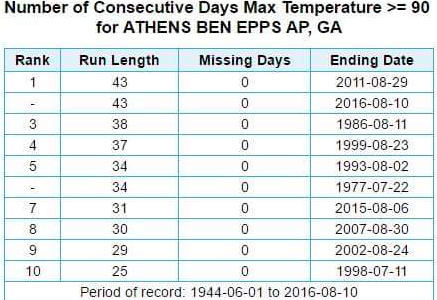Sources of weather and climate data
-

Today marks the 43rd day in a row of high temperatures in Athens GA that were at or above 90 F. This ties us with the all-time record set in 2011, based on records going back to about 1903 combined from the city and airport data. Will we break the record tomorrow? It will be…
-

The College of DuPage web site has updated satellite images which show the slowly spinning low pressure that is bringing rain to parts of the Southeast. I’ve put one from the afternoon of August 8 below. It shows the low slowly meandering across Georgia. You can also see it in the radar picture, which I’ve…
-

Here is a useful interactive web site you might find useful in looking at the rain in the Southeast this week. It allows you to zoom and to look at future rain forecasts as well as current radar conditions, satellite imagery, and flood watches and warnings. You can find it by clicking here.
Posted in: Sources of weather and climate data -

Last night was a doozy for those of us living right in Athens, GA. From about 9:30 pm to just shy of 11:30 pm, the airport received 4.96 inches of rain. Strong thunderstorm cells rained continuously over the area with only minor movement over the 2-hour period. I live about a mile south of the…
-

William Schmitz of the Southeast Regional Climate Center pointed out a great source of historical hurricane track information to me today. You can find it at https://weather.unisys.com/hurricane/index.php. This provides the best known tracks to hurricanes going back to 1851. (The map below is for 1893 just because it has a lot of tracks on it.) Obviously,…
-

I am happy to announce the birth of a new website for the University of Georgia automated weather station network. You can still find the main portal at https://www.georgiaweather.net/, although that may change in the future. The website has a fresh new look and more readily available information. I encourage you to visit them and see…
-

Growing Georgia reprinted a story by Merritt Melancon of UGA on the recent string of very hot days here in Athens and other parts of Georgia yesterday. You can read it here. Another story about the hot weather appeared this morning in OnlineAthens.com here. Both of them use information I provided from a number of…